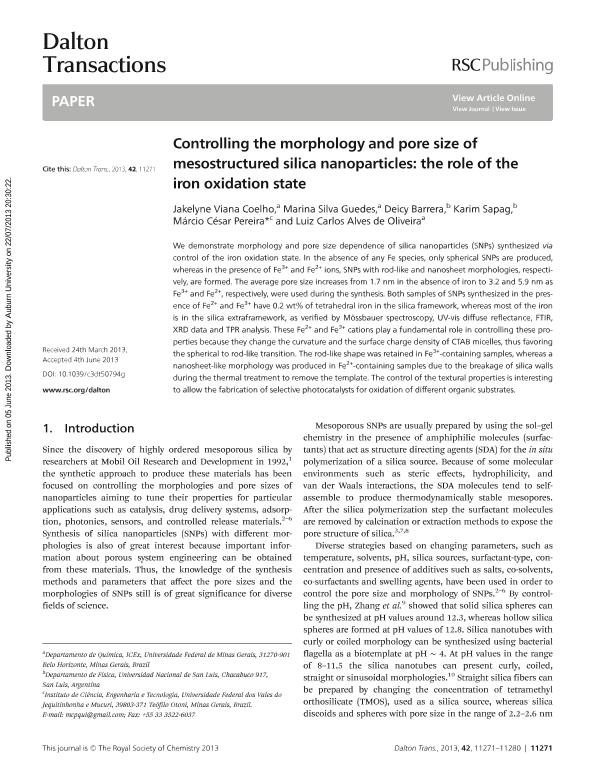Mostrar el registro sencillo del ítem
dc.contributor.author
Coelho, Jakelyne Viana
dc.contributor.author
Guedes, Marina Silva
dc.contributor.author
Barrera Diaz, Deicy Amparo

dc.contributor.author
Sapag, Manuel Karim

dc.contributor.author
Pereira, Márcio César
dc.contributor.author
de Oliveira, Luiz Carlos Alves
dc.date.available
2016-05-16T20:42:23Z
dc.date.issued
2013-08
dc.identifier.citation
Coelho, Jakelyne Viana; Guedes, Marina Silva; Barrera Diaz, Deicy Amparo; Sapag, Manuel Karim; Pereira, Márcio César; et al.; Controlling the morphology and pore size of mesostructured silica nanoparticles: the role of iron oxidation state; Royal Society of Chemistry; Dalton Transactions; 42; 31; 8-2013; 11271-11280
dc.identifier.issn
1477-9226
dc.identifier.uri
http://hdl.handle.net/11336/5703
dc.description.abstract
We demonstrate morphology and pore size dependence of silica nanoparticles (SNPs) synthesized via control of the iron oxidation state. In the absence of any Fe species, only spherical SNPs are produced, whereas in the presence of Fe3+ and Fe2+ ions, SNPs with rod-like and nanosheet morphologies, 10 respectively, are formed. The average pore size increase from 1.7 nm in the absence of iron to 3.2 and 5.9 nm as Fe3+ and Fe2+, respectively, were used during the synthesis. Both samples of SNPs synthesized in the presence of Fe2+ and Fe3+ have 0.2 wt.% of tetrahedral iron in the silica framework, whereas most of the iron is in the silica extraframework, as verified by Mössbauer spectroscopy, UV-vis diffuse reflectance, FTIR, XRD data and TPR analysis. These Fe2+ and Fe3+ cations play a fundamental role to 15 control these properties because they change the curvature and the surface charge density of CTAB micelles, thus favoring the spherical to rod-like transition. The rod-like shape was retained in Fe3+- containing sample, whereas a nanosheet-like morphology was produced in Fe2+-containing sample due to the breakage of silica walls during the thermal treatment to remove the template. The control of the textural properties is interesting to allow the fabrication of selective photocatalysts for oxidation of 20 different organic substrates.
dc.format
application/pdf
dc.language.iso
eng
dc.publisher
Royal Society of Chemistry

dc.rights
info:eu-repo/semantics/openAccess
dc.rights.uri
https://creativecommons.org/licenses/by-nc-sa/2.5/ar/
dc.subject
Mcm 41
dc.subject
Mossbauer
dc.subject
Iron Oxide
dc.subject
Rtp
dc.subject.classification
Ingeniería de los Materiales

dc.subject.classification
Ingeniería de los Materiales

dc.subject.classification
INGENIERÍAS Y TECNOLOGÍAS

dc.title
Controlling the morphology and pore size of mesostructured silica nanoparticles: the role of iron oxidation state
dc.type
info:eu-repo/semantics/article
dc.type
info:ar-repo/semantics/artículo
dc.type
info:eu-repo/semantics/publishedVersion
dc.date.updated
2016-05-13T13:43:14Z
dc.journal.volume
42
dc.journal.number
31
dc.journal.pagination
11271-11280
dc.journal.pais
Reino Unido

dc.journal.ciudad
Cambridge
dc.description.fil
Fil: Coelho, Jakelyne Viana. Universidade Federal Do Minas Gerais; Brasil
dc.description.fil
Fil: Guedes, Marina Silva. Universidade Federal Do Minas Gerais; Brasil
dc.description.fil
Fil: Barrera Diaz, Deicy Amparo. Consejo Nacional de Investigaciones Científicas y Técnicas. Centro Científico Tecnológico San Luis. Instituto de Física Aplicada; Argentina
dc.description.fil
Fil: Sapag, Manuel Karim. Consejo Nacional de Investigaciones Científicas y Técnicas. Centro Científico Tecnológico San Luis. Instituto de Física Aplicada; Argentina
dc.description.fil
Fil: Pereira, Márcio César. Universidade Federal dos Vales do Jequitinhonha e Mucuri. Instituto de Ciência, Engenharia e Tecnologia ; Brasil
dc.description.fil
Fil: de Oliveira, Luiz Carlos Alves. Universidade Federal Do Minas Gerais; Brasil
dc.journal.title
Dalton Transactions

dc.relation.alternativeid
info:eu-repo/semantics/altIdentifier/url/http://pubs.rsc.org/en/Content/ArticleLanding/2013/DT/C3DT50794G
dc.relation.alternativeid
info:eu-repo/semantics/altIdentifier/doi/http://dx.doi.org/10.1039/C3DT50794G
Archivos asociados
